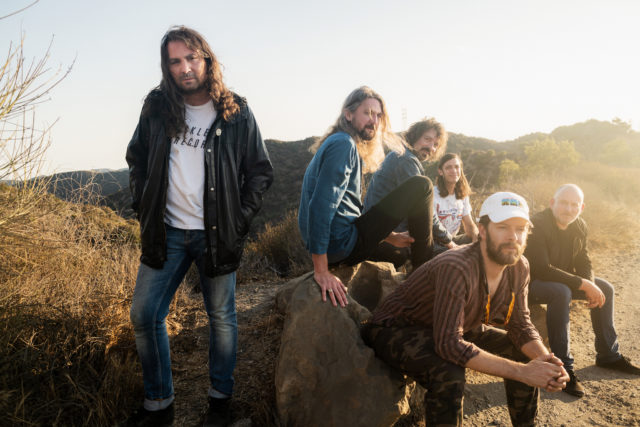
Adam Granduciel is restless. Every day the 43-year-old lead guitarist and vocalist for The War on Drugs wakes up buzzing with the urge to accomplish “a million things”—spend time with his kid, maybe play a couple hours of tennis or a round of golf, and then get into the studio to write a new song.
“Restlessness is just part of living,” he says. “These themes that we write about, that we find comfort in, that we are compelled to express in music, are things that we can’t escape from. They’re a huge part of my life.”
That restlessness can be productive, as evidenced by The War on Drugs’ critically acclaimed five-album discography. But it can also teeter into darker places. Granduciel says it’s all part of the fabric of life that becomes more intricate with age.
“You’re never healed or cured from any sort of anxiety, depression, restlessness, whatever,” he says. “You just incorporate it into your life as you get older.”
Having gotten their start in the early aughts, Granduciel and The War on Drugs have had decades to incorporate such familiar feelings into their lives and music. But there’s a first time for everything, including an inaugural stop at Red Rocks on Sept. 19.
Calling it “a right of passage,” Granduciel says performing at the storied Colorado amphitheater may even top selling out Madison Square Garden earlier this year. It’s a culmination of years of friendship and touring, with each member coming into their own to help the band build a reputation for arena-filling live shows many touring acts can only dream of.
“The live thing especially is a direct result of who we have up there and what everyone’s become,” Granduciel says. “The band just keeps getting better. It’s been a really nice evolution of how the records get made and then how they get interpreted on a stage in front of a lot of people.”
The band’s current lineup consists of six members who came together for the band’s 2014’s breakthrough album, Lost in the Dream—David Hartley (bass), Robbie Bennett (keyboards), Charlie Hall (drums), Jon Natchez (saxophone, keyboards), Anthony LaMarca (guitar)—plus Eliza Hardy Jones, whom Granduciel knows from the tight-knit indie rock scene of Philadelphia.
“Fifteen years ago I would not have thought we’d be a seven-piece band with this many keyboards and everything,” Granduciel says. “It’s been able to evolve, and there’s a little mystery to it, and it can be whatever you want it to be.”
Sitting in the uncertainty
Fifteen years ago, Granduciel spent his days playing music with his friends in the Fishtown neighborhood of Philadelphia, creating what would become The War on Drugs with good friend turned solo-artist Kurt Vile. Together they released the band’s first album, Wagonwheel Blues, in 2008.
The pair bonded over a love of Bob Dylan and Bruce Springsteen, two influences woven throughout the War on Drugs cannon. Such foundational artists offer insight into the band’s generation-spanning appeal.
Reflecting on the band’s early history, Granduciel says it all seemed to happen in a vacuum. There were shows most nights, with bands forming just as frequently, populated by an array of musicians hanging out at parties, jamming and listening to music together.
“You experienced culture on a very micro level,” he says of those pre-social media days. “And it just felt innocent or something… I don’t know what it’s like to be doing that now.”
Granduciel comes back to a sense of gratitude about those years he spent learning about music, writing and recording with neighborhood friends before selling out the larger-than-life arenas and stadiums where The War on Drugs would come to feel at home.
While the live show has evolved in its own way, so has the process of recording. It’s not so much a matter of translating the stage performance into the studio, Granduciel says. Instead, it’s more about expressing the unique musicality and personality of each member of the band.
But as the lyricist and main songwriter, Granduciel says producing albums is still a “tortured process,” even after all this time. The group’s fifth record, last year’s I Don’t Live Here Anymore, took three and half years to complete. Never feeling satisfied is the momentum behind the craft.
“There’s no cure for wanting to keep uncovering new songs,” he says. “Nothing can sway you from making your art.”
Lately, Granduciel has been tinkering around with some new ideas, but at this point, he’s unsure of what it will turn into. Each record, perhaps even each song, is a mixture of exacting precision and some scrappy improv, as Granduciel is known to finish lyrics in the studio at the last minute.
Sometimes, he says, a song just reveals itself, but most of the time he sits in the uncertainty of where a song will end up. It’s all part of the cycle, “the art of making a record,” he says. It starts on top of the world, with excitement building around a new concept, before inevitably crashing into insecurity and doubt. That’s usually followed by a lull in which Granduciel questions everything he’s created so far. But the upswing always comes.
“I think that at the end of the day, when I sit down and listen back to something I’ve been working on and it hits a nerve with me, it’s usually because there’s something in there that I know to be true,” he says. “And that feels like something I want to be singing about.”
In that moment, Granduciel knows he’ll eventually get back to the place of pride in what he’s created—a place of calm before the next day comes, and the process starts all over again.














